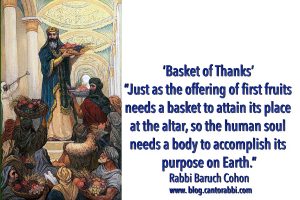A BASKET OF THANKS — “Kee Tavo” Deut. 26-29:8, by Rabbi Baruch Cohon
_
This week Moses concludes his second “parting discourse” and begins
the third. His message once again highlights choices, to be
dramatically presented to the people once they enter the Promised
Land. Six tribes will hail the positive choices on one mountainside,
and the other six will warn about the negatives on the facing
mountainside. The great leader reminds us of our Divine Covenant. He
recalls our ancestors’ suffering in Egypt, and accepting the Law with
all its brilliant blessings and its threatened curses. And he
concludes by recounting the spectacular victory over enemy tyrants
like Sikhon the Amorite king and Og, king of Bashan.
_
Before launching into his oratory, however, Moses delivers a simple
commandment about First Fruits. In the very second sentence of this
week’s reading he says: “Take some of the first [to ripen] from every
fruit of the ground, that you gather from the land that G-d is giving
you, and put them in a basket. Then go to the place that G-d will
choose for His name to dwell there, and go to the “cohen” (the
priest) who will be there in those days and tell him: “I declare
before G-d today that I came into the land that He swore to our
fathers to give us.” One Talmudic rabbi with a sense of humor asks
about the “cohen who will be there: Could I take it to the cohen who
will NOT be there?” Then he interprets: Never mind whether the
“cohen” is great or ordinary, whether he is your friend or not. Just
deal with the resident priest.
_
Back to Moses’ teaching: “And the priest will take the basket from
your hand and place it before the altar.” Not all the crops qualify
to enter the basket, says Rashi, quoting the Talmud. Just the seven
fruits typical of the Land of Israel: wheat, barley, vines, figs,
pomegranates, olives and date-honey. These crops represent the land.
Bringing them to the altar expresses the Jew’s thanks for that land.
_
Let’s nitpick a little more. Why must the First Fruits be placed in a
basket? Really, why “dafka” a basket? Other mitzvot about offerings
have no such specifications. Couldn’t the farmer just tie them in a
bundle? Shlep them in a sack? What is so special about this basket
that Moses includes it in the commandment?
_
It remained for the Lubavitcher Rebbe to deal with this question. In
his Likutei Sichos he quotes the Midrash that teaches the mystical
idea of creation, namely that the Divine intention to create Jewish
souls “preceded everything.” So Jewish souls are comparable to First
Fruits. From this mystic text, we learn that before birth the soul is
in Heaven enjoying a pure and ecstatic relationship with the Creator.
Nevertheless that soul is sent to Earth to inhabit a body which
conceals its Divine relationship. But through the very concealment, a
human soul can carry out a mission in the physical world which is
exactly G-d’s purpose in sending it here. In essence, then, just as
the offering of First Fruits needs a basket to attain its place at the
altar, so the human soul needs a body to accomplish its purpose on
Earth.
_
Following this idea through, we can conclude that just as the priest
“takes the basket from your hand,” so the L-rd takes the body when the
time comes. Let us hope that the soul within that body earned its
place on the holy altar.



